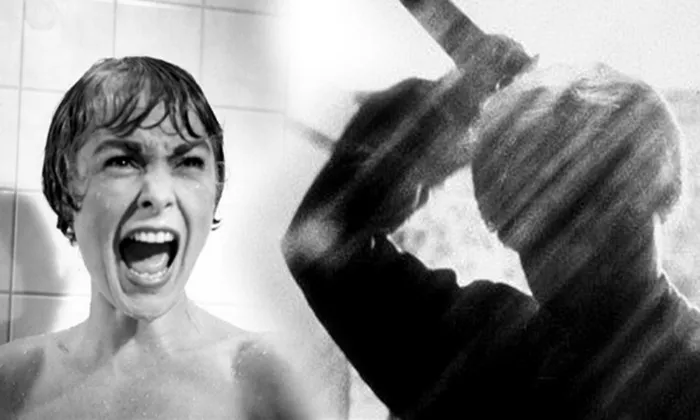Alfred Hitchcock’s “Psycho” is undeniably one of the most iconic and influential films in cinematic history. Released in 1960, it pushed boundaries, broke conventions, and shocked audiences with its bold storytelling and subversive themes. Decades later, “Psycho” remains a landmark of the horror genre, but its controversial aspects continue to provoke discussion and analysis. From its depiction of violence to its exploration of taboo subjects, here’s why “Psycho” remains controversial over 60 years after its release.
1. The Shower Scene:
Perhaps the most infamous aspect of “Psycho” is the shower scene, in which Marion Crane (played by Janet Leigh) is brutally murdered by a mysterious assailant while taking a shower. The scene, which lasts less than three minutes, shocked audiences with its graphic violence and innovative editing techniques. Hitchcock’s decision to kill off the film’s protagonist midway through the story was unprecedented at the time and challenged traditional narrative conventions. The visceral impact of the shower scene sparked debates about the portrayal of violence in cinema and its effects on audiences.
2. Subversion of Expectations:
“Psycho” is renowned for its masterful manipulation of audience expectations. Hitchcock lulls viewers into a false sense of security by presenting Marion Crane as the film’s protagonist, only to abruptly kill her off and shift the focus to Norman Bates (Anthony Perkins) and his eerie motel. This subversion of expectations was groundbreaking in 1960 and continues to fascinate audiences today. By defying genre conventions and narrative norms, “Psycho” challenged viewers to question their assumptions and challenged the notion of the “safe” protagonist.
3. Themes of Sexuality and Madness:
At its core, “Psycho” is a deeply psychological film that explores themes of sexuality, repression, and madness. Norman Bates, the film’s antagonist, is a complex character whose psyche is shaped by his domineering mother and his own repressed desires. His descent into madness and split personality are depicted with a mixture of empathy and horror, blurring the lines between victim and villain. “Psycho” confronts viewers with uncomfortable truths about the human condition, including the taboo subject of incestuous desire and the consequences of psychological trauma.
4. Portrayal of Mental Illness:
“Psycho” has been criticized for its portrayal of mental illness and its perpetuation of harmful stereotypes. Norman Bates, a character diagnosed with dissociative identity disorder (formerly known as multiple personality disorder), is depicted as a dangerous and unpredictable figure whose condition is linked to his violent behavior. While the film is a product of its time and reflects prevailing attitudes toward mental illness in the 1960s, some viewers have argued that its portrayal of Norman Bates reinforces negative stereotypes and stigmatizes individuals with mental health conditions.
5. Censorship and Controversy:
“Psycho” faced significant censorship and controversy upon its release, with censors objecting to its explicit violence, sexual content, and subversive themes. Hitchcock had to fight to retain creative control over the film, making concessions to appease censors while preserving the integrity of his vision. Despite these challenges, “Psycho” became a box office success and received critical acclaim, cementing its reputation as a groundbreaking work of cinema.
6. Influence on Popular Culture:
The impact of “Psycho” extends far beyond the confines of the silver screen, permeating popular culture in myriad ways. The film’s iconic imagery, memorable score, and indelible characters have been parodied, referenced, and imitated countless times in film, television, literature, and music. From its famous shower scene to its haunting final shot, “Psycho” has left an indelible mark on the collective consciousness, ensuring its place in the pantheon of cinematic classics.
7. Legacy and Cultural Significance:
Six decades after its release, “Psycho” remains a touchstone of the horror genre and a testament to Alfred Hitchcock’s mastery of suspense. Its influence can be seen in countless horror films that followed, from slasher classics like “Halloween” to psychological thrillers like “The Silence of the Lambs.” “Psycho” continues to captivate and disturb audiences with its timeless themes, unforgettable characters, and groundbreaking storytelling, ensuring its status as a cultural landmark for generations to come.
Conclusion
In conclusion, “Psycho” remains controversial for its graphic violence, subversive storytelling, exploration of taboo subjects, portrayal of mental illness, censorship battles, influence on popular culture, and enduring legacy. Despite the passage of time, Alfred Hitchcock’s masterpiece continues to shock, provoke, and enthrall audiences with its unflinching examination of the human psyche and its power to both terrify and captivate.
Related Topics:
Why is Silence of the Lambs so highly rated?

